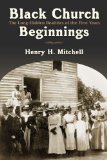As an Amazon Associate I earn from qualifying purchases.
 Henry Mitchell’s central point in his work Black Church Beginnings: The Long-Hidden Realities of the First Years, is that African Americans did not learn Black Christianity from the white structure. Mitchell attacks this idea by arguing that Black people were not without God and that their African Traditional Religion formed just as solid a foundation for Christianity as the Old Testament.(41) In this Mitchell agrees with Dwight N Hopkins who devotes a portion of his book, Shoes That Fit Our Feet: Sources for a Constructive Black Theology, to looking at African contributions to Slave Theology. Both agree that some of the central claims of Christianity, like the omniscience of God and the omnipotent power of God, were already indigenous to Africans.
Henry Mitchell’s central point in his work Black Church Beginnings: The Long-Hidden Realities of the First Years, is that African Americans did not learn Black Christianity from the white structure. Mitchell attacks this idea by arguing that Black people were not without God and that their African Traditional Religion formed just as solid a foundation for Christianity as the Old Testament.(41) In this Mitchell agrees with Dwight N Hopkins who devotes a portion of his book, Shoes That Fit Our Feet: Sources for a Constructive Black Theology, to looking at African contributions to Slave Theology. Both agree that some of the central claims of Christianity, like the omniscience of God and the omnipotent power of God, were already indigenous to Africans.
A second argument by Mitchell is that the African slaves did not accept that which was  preached to them. White America attempted to use the Bible to teach slaves to be obedient. In contrast, the Africans looked in the Bible and found in Jesus a fellow traveler in pain. In the doctrine of hell they found a reaffirmation of God’s justice. And in the Bible they found another repository of wisdom of the ancestors. None of these things were directly taught to the African from the white society and so Mitchell believes that they came from the interaction between African traditional religion and Christianity. A third component of Mitchell’s argument is that Christianity did not grow until the culture of the African was respected by Christianity. Thus, according to Mitchell’s argument, it was only after the first and second great awakenings when enthusiastic religion of the heart was embraced by much of the country that Black people really began joining Christianity in large groups.
preached to them. White America attempted to use the Bible to teach slaves to be obedient. In contrast, the Africans looked in the Bible and found in Jesus a fellow traveler in pain. In the doctrine of hell they found a reaffirmation of God’s justice. And in the Bible they found another repository of wisdom of the ancestors. None of these things were directly taught to the African from the white society and so Mitchell believes that they came from the interaction between African traditional religion and Christianity. A third component of Mitchell’s argument is that Christianity did not grow until the culture of the African was respected by Christianity. Thus, according to Mitchell’s argument, it was only after the first and second great awakenings when enthusiastic religion of the heart was embraced by much of the country that Black people really began joining Christianity in large groups.
Strengths of the Book
 One of the strengths of the book is Mitchell’s argument that the Black church was militant and prophetic along with being pastoral. Eugened Genovese in his work Roll Jordan Roll: The World the Slaves Made argues that while the Black preacher was very important helping Black people keep their sanity, the Black preacher, in general, was not militant. He argues that Traditional African religion was life affirming and not otherworldly which could not propel millennial ideologies which would fuel militancy.(275) I think this view does not take into account the many acts of militancy that the Black church did engage in. Mitchell reminds us that the black church and individuals in the black church were militant in many ways. The clandestine religious meetings we call “Invisible Institution, the slave insurrections, Underground Railroad, and those slaves who simply ran away all point to an African American religion that fueled militant undertakings.
One of the strengths of the book is Mitchell’s argument that the Black church was militant and prophetic along with being pastoral. Eugened Genovese in his work Roll Jordan Roll: The World the Slaves Made argues that while the Black preacher was very important helping Black people keep their sanity, the Black preacher, in general, was not militant. He argues that Traditional African religion was life affirming and not otherworldly which could not propel millennial ideologies which would fuel militancy.(275) I think this view does not take into account the many acts of militancy that the Black church did engage in. Mitchell reminds us that the black church and individuals in the black church were militant in many ways. The clandestine religious meetings we call “Invisible Institution, the slave insurrections, Underground Railroad, and those slaves who simply ran away all point to an African American religion that fueled militant undertakings.
Conclusion
As preachers in the African American tradition we must always keep in mind the history that we came from. This includes the fact that our ancestors as preacher in the black tradition had to worship as a clandestine activity. Preaching was so important that people risked life and limb to come hear a “Word from the Lord.” So as we keep in mind the aspects of style that Genovese reminded us of, we also must recognize that importance of great preaching to our survival and to our continual survival.
Amazon and the Amazon logo are trademarks of Amazon.com, Inc, or its affiliates.

